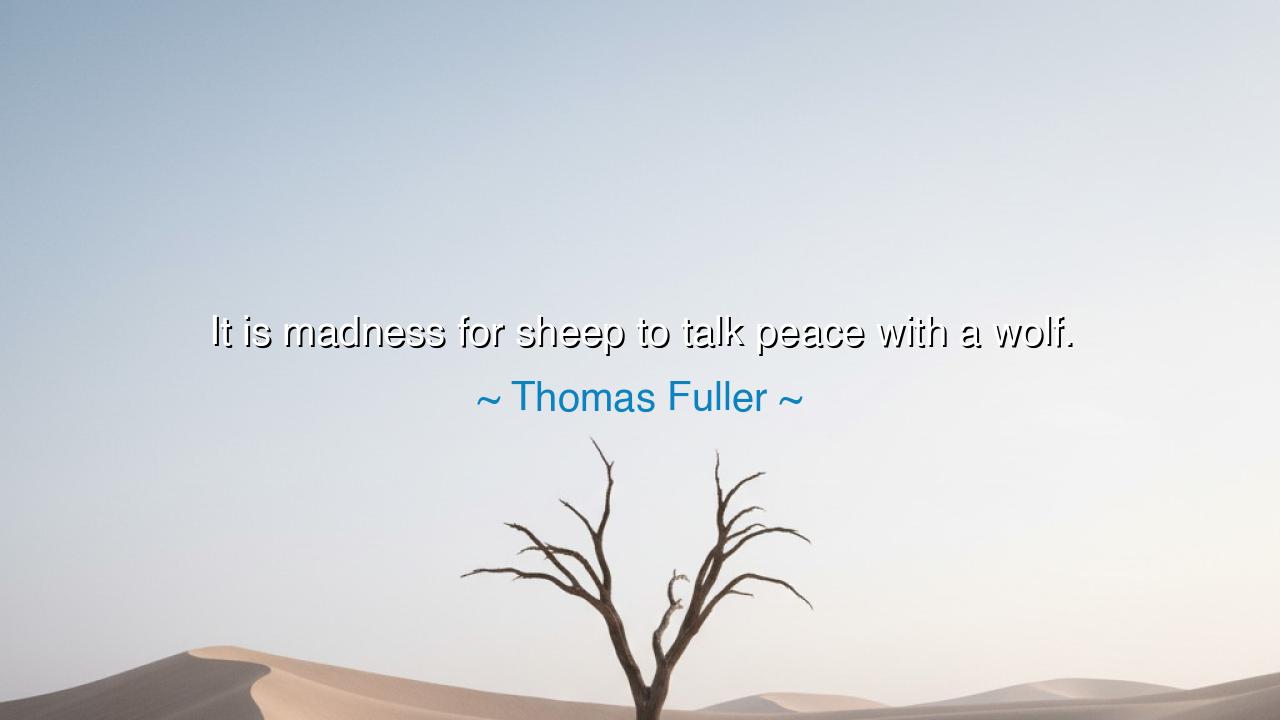
It is madness for sheep to talk peace with a wolf.






The words of Thomas Fuller — “It is madness for sheep to talk peace with a wolf.” — strike the ear with the raw clarity of nature’s law. Here is no gentle proverb of compromise, but a stern warning: that there are those in this world whose nature is not to live in harmony, but to devour. For the sheep, innocent and vulnerable, to sit in counsel with the wolf is folly, for the wolf’s hunger cannot be reasoned with, nor his fangs blunted by words. Fuller speaks to the eternal truth that peace cannot be made with those who have no desire for it, and that wisdom lies in discerning when dialogue is noble and when it is naïve.
The imagery itself is ancient. Across cultures, the wolf has long symbolized the predator, cunning and ruthless, while the sheep stands for innocence, meekness, and trust. To ask a wolf for mercy is to forget his nature; to ask a sheep to negotiate is to ask the defenseless to speak in the language of the destroyer. Fuller’s proverb, born in the 17th century, reflects the hard lessons of his age, where nations, often cloaked in diplomacy, still devoured one another through war and treachery. His words cut through illusion: not all who speak of peace seek it.
History abounds with examples that make this wisdom plain. Consider the fate of Czechoslovakia in 1938, when it sought peace with Nazi Germany through the Munich Agreement. The leaders of Europe, like sheep, thought they could satisfy the wolf with territory and promises. But the wolf was not satisfied; it hungered for more. Within a year, the nation was consumed, and soon all of Europe was aflame. This was the madness Fuller warned of: to speak of peace with those whose very intent is conquest and destruction.
Yet, the teaching is not to reject all peace, but to temper peace with prudence. There are wolves in the world, but there are also men and nations who can be reasoned with, whose hearts still beat with conscience. Wisdom lies in discernment: knowing when words can heal, and when they are but whispers before the snapping of jaws. To be naïve is to invite ruin; to be watchful is to preserve life and dignity. Peace is always noble, but peace without caution is perilous.
This lesson also dwells within the human heart. Each of us carries wolves and sheep inside: impulses that devour and impulses that yield. To bargain with one’s own destructive instincts, to tell oneself “I will indulge this hunger just a little, and it will be appeased,” is to repeat the folly of the sheep. For greed, envy, lust, and anger are wolves — they cannot be pacified with small offerings; they must be mastered, restrained, and guarded against. Thus Fuller’s wisdom is not only for kings and nations, but for every soul who would seek harmony within.
The lesson is clear: seek peace, but not blindly. Do not enter into covenants with those who have no respect for truth. Do not imagine that the fangs of a wolf can be softened by kind words alone. Strength must stand behind peace, and vigilance must accompany trust. Guard yourself, your family, your community, your nation — not with paranoia, but with prudence, knowing that not every enemy can be made a friend.
Practical actions follow. When facing conflict, first discern the nature of the other. If they are open to reason, extend your hand. If they are wolves, protect your ground, and do not give away your strength in hopes of buying safety with submission. In personal life, do not bargain with destructive habits, but cut them off with firmness. In society, support leaders who understand both the necessity of peace and the vigilance required to preserve it.
So remember, child of tomorrow: peace is a crown worth seeking, but it must not be sought in folly. Sheep cannot find safety in the jaws of wolves. Build your peace upon truth, upon discernment, upon strength — and you will walk wisely in a world where innocence and predation ever contend. This is the lesson Fuller passed down: a warning wrapped in metaphor, that we may not confuse hope with blindness, nor mistake the hunger of wolves for the will of peace.






AAdministratorAdministrator
Welcome, honored guests. Please leave a comment, we will respond soon